His Secret Life
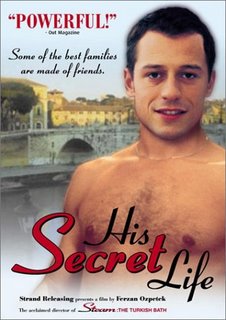
His Secret Life (Le Fate Ignoranti)
(2001)
Director: Ferzan Ozpetek
Writers: Ferzan Ozpetek, Gianni Romoli
Genre: Drama
Synopsis: AIDS doctor Antonia's husband is killed by a car. She gets depressed until she learns he had been cheating on her with a man. Following her newly born curiosity for life, she goes to see her husband's lover, Michele, and finds a huge apartment that he shares with gay and transgendered friends, including a Turkish immigrant and a prostitute. Antonia is reluctant to tell these people of her relationship to the dead man, but needs prompting to move on to a new phase of her life.
Cast:
Margherita Buy .... Antonia

Stefano Accorsi .... Michele

Serra Yilmaz .... Serra
Gabriel Garko .... Ernesto
Erika Blanc .... Veronica (as Erica Blanc)
Andrea Renzi .... Massimo
Koray Candemir .... Emir
Lucrezia Valia .... Mara
Filippo Nigro .... Riccardo
Ivan Bacchi .... Luciano
Maurizio Romoli .... Angelo
Carmine Recano .... Israele
Luca Calvani .... Sandro
Rosaria De Cicco .... Luisella
Edilberta Caviteno Bahia .... Nora
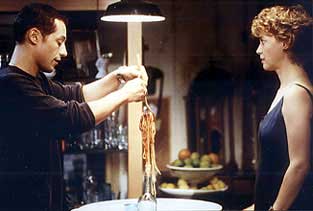
Also Known As:
Le Fate ignoranti
(Italia)
Tableau de famille (France)
The Ignorant Fairies (International: English title)
MPAA: Rated R for language and sexuality.
Runtime: 106 min / Argentina:110 min (Mar del Plata Film Festival) / UK:109 min
Country: Italy / France
Language: Italian / Turkish
Color: Color
Sound Mix: Dolby Digital
Reviews
Antonia, happily married to Massimo, has her life turned upside down when he is killed in a car accident. At first, she tries to deaden her pain with scotch and pills, but it is finding the unsettling truth about Massimo's secret life that allows her to break free and move on. She is devastated and alone after his death, because his needs have eclipsed hers during the 10 years of their marriage. She has no child. Her medical career has taken a back seat. Her mother is not a great comfort.

When Antonia finds a painting inscribed to Massimo, clearly from a lover, she becomes determined to find his secret love. She follows the leads to an apartment house in the colorful and ancient Ostiense district of Rome. The inhabitants of the apartment are no less colorful. She meets resistance but keeps coming back until the truth slowly dawns. Conventional expectations being what they are, director Ferzan Ozpetek (Steam: The Turkish Bath) cleverly lets us watch Antonia come to realize what seems so obvious: Massimo's lover is Michele, a handsome young buck who lives in the apartment building with this family-like mélange.
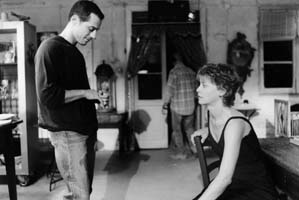

The dissection of the lies and secrets continues through the film, suggesting that most of us live by the grace of lies that allow us to not see some of life's harsher realities. Antonia (Margherita Buy) finds comfort and friendship among these eccentric characters that have been part of Massimo's life for seven years. For seven years, he spent a lot of time with this surrogate family, laughing, dancing, cooking, and eating with them. And he has loved Michele (Stefano Accorsi, The Last Kiss), the testosterone driven charmer who lives life in the fast lane on the gay club circuit. Michele has been bitter about only having stolen moments with Massimo, although it is Antonia who has been deceived. Michele is a guy who often wants most what he can't have. He is caring for Ernesto, HIV positive, sick, and whose lover has disappeared.
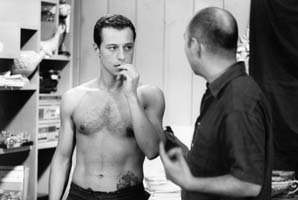
Michele, at first angry and bitter about the crumbs of Massimo he got, comes to value and even love Antonia, in a way that comes as a surprise to him. She has been kind and straightforward with the group, summarily delivering IV drugs to Ernesto. Antonia is a doctor who works with AIDS patients. The first time she is invited to share a meal, she is met with unfriendliness as they try to give misplaced support to Michele. They are embarrassed and sorry. They include Stella and her brother Emir, who fled Istanbul and a painful past, and Mara, a transsexual whose sex change operation has her uneasy about going home after a ten year absence. The sharp contrast between the cluttered, noisy, cheerful apartment, where a wonderful meal is always being cooked and the tranquil, minimalist, suburban villa outside Rome, that Antonia shared with Massimo, is an effective visual metaphor for the vast differences that seem to separate the people.
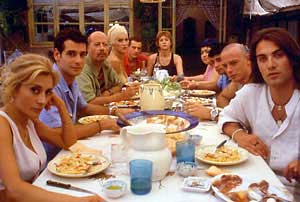
The film doesn't delve into Massimo's motives or rationale, but rather, lays bare what is left behind. Antonia has relinquished pursuit of her own life (medical school, children) to make a life that suited Massimo. It is not surprising, but very refreshing, that the core of the film is her journey to uncover the secrets of her own life. Along the way, Michele learns a few things himself: People are a product of the sum of the past, of what has happened to them or failed to happen and what they've chosen to believe.

As too often occurs, a foreign language film is given a prosaic title for release in the United States, although the Italian title The Ignorant Fairies, referring to the painting that leads Antonia to the apartment house, is so much more interesting. The well-chosen music underscoring the scenes of operatic tragedy, or the wistful jazz trumpets that fold over the boisterous club scene, add nicely to the story telling. This is a fine, original, and touching film.
Short biography of
Stefano Accorsi

Stefano Accorsi was born in Bologna on 2nd March 1971. He graduated from the Theatrical School of Bologna in 1993 and he played for some years at the theatre, before beginning the cinema. He made his first film Fratelli e Sorelle (Brothers and Sisters) in 1991, in the USA.
In 1995 he was the protagonist of Jack Frusciante è uscito dal gruppo, one of his most known films.
In 1998 he worked with Daniele Luchetti in I Piccoli Maestri, which was in Competition for the Golden Lion at the Venice International Film Festival.
Of the same year is the film Radiofreccia, which had a big success in Italy and with whom Stefano won 3 prizes.
L'ultimo bacio (Last kiss) is the title of one of his last films (2001) which had an incredible success in Italy.
He won the leading role in Maria de Medeiros’ Capitães de Abril (April Captains), and has worked with director Nanni Moretti in La stanza del figlio (The son's room - the film is the Winner of the Palme d'Or in Cannes 2001).
In 2001 Accorsi also head the leading role in Ferzan Ozpetek's Le fate ignoranti (His secret life), which was in competition at the 2001 Berlin International Film Festival. This film was a big success in Italy and in Turkey and Stefano, who played the role of an homosexual boy, won 3 awards for his wonderful interpretation.
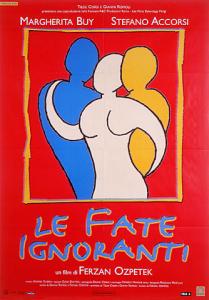
He played in David Blair's Tabloid tv (UK) and in Marco Ponti's Santa Maradona (I).
The latter has been shown in Italian cinemas in November- December 2001 and was appreciated by the public, becoming the most seen Italian film of the season.
Then Accorsi acted in the tv-film Il Giovane Casanova by Giacomo Battiato, shooting in Paris for France 2 and in Italy for Canale 5.
His last film is Un viaggio chiamato amore (A journey called love) which took part in the Venice International Film Festival 2002 and with which Stefano won the Coppa Volpi, the award for best male performance. The role Stefano Accorsi plays in the film is the Italian poet Dino Campana.
He didn't shoot any film for about an year, in which he went to France where he learned French.
He went to the Venice International Film Festival 2003 as a member of the jury. In 2004 he shooted two movies: "Ovunque sei", directed by by Michele Placido (the same director of "Un viaggio chiamato amore") where he plays the role
of a doctor of the first aid; "L'amore ritrovato", directed by Carlo Mazzacurati, a sweet love story between a married man (Accorsi) and a past love (Maya Sansa). Both these movies participated at the Venice International Film Festival 2004, the second one not in competition.
2005 starts in a very good way: his last movie "Provincia Meccanica", of the director Stefano Mordini, has just been selected as a representative of Italy at the Berlin Film Festival in February and he's almost ended to shoot in Rome "Romanzo criminale", still directed by Michele Placido, featuring many famous italian actors
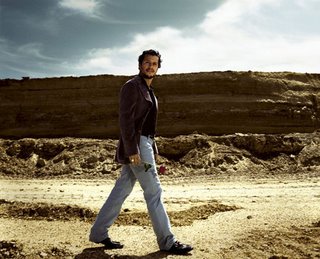

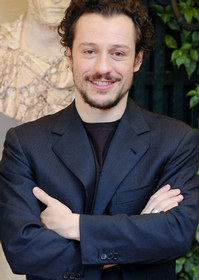
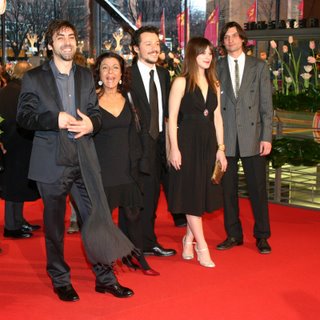

0 Comments:
Post a Comment
<< Home